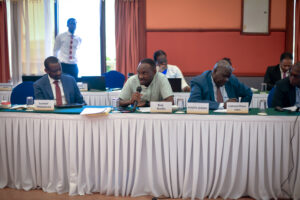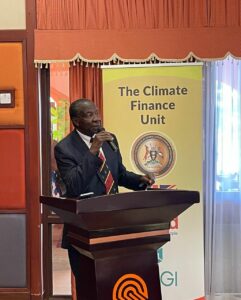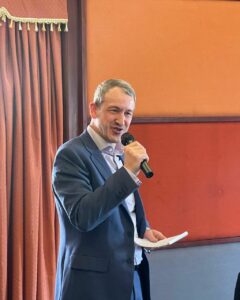With countries around the world suffering the effects of climate change, stakeholders in the East African region are calling for more deliberate efforts to ensure social justice, especially for the most vulnerable.
On the 16th February 2023, the Ministry of Finance, Planning and Economic Development with support from the Global Green Growth Institute and funding from the UKAid organized a climate finance meeting for directors from ministries responsible for climate change affairs and for national treasuries from Burundi, Democratic Republic of Congo, Rwanda, Kenya, Tanzania, South Sudan and Uganda. These met in Kampala for the first time to discuss a new collective goal on climate finance and shared experiences on climate finance access and implementation. They were joined by delegates from the United Arab Emirates which will host this year’s annual UN member countries’ international climate conference (COP28) and officials from the East African Commission.

Some of the participants at the meeting.
During this dialog, countries shared their experiences on climate finance access and how to attain the desired levels of climate financing needed for adaptation and mitigation actions. This aimed at enhancing regional climate action for the East African countries to build consensus on the most critical actions feasible at the country level to catalyze regional climate action.
Sufficient climate finance is crucial to support countries of East Africa (EA) green their economies and build resilience to the inevitable impacts of climate change, which include ever more intense and severe storms, drought and floods. It is also essential to achieving the key Paris Agreement goal of limiting global average temperature rise to as close as possible to 1.5 degrees Celsius.

Hon. Matia Kasaija opening the East Africa region finance meeting.
Hon. Matia Kasaija the Minister of Finance in Uganda while addressing the delegates highlighted the fact that Uganda has created an enabling framework for addressing climate change and promoting green growth. This is in line with the enabling framework put in place within the East Africa region to address climate change most notably the East Africa Climate Change Policy, EAC Climate Change Master Plan, the EAC Climate Change Strategy and more recently the EAC Climate Finance Access and Mobilization Strategy (2022/23–2031/32).
Commissioner Robert Okidi, speaking on behalf of the Permanent Secretary of the Ministry of Finance, Planning and Economic Development, said: “This meeting is very timely in bringing us together as countries within the East Africa region to share information, knowledge and experience on mobilizing climate finance. From the rich discussion we have had in the past days and our Road Map of agreed actions, the ground is now set for action.”

Dr. Bejamin Smith addressing attendees.
Dr. Benjamin Richard Smith, of the London-based Taskforce on Access to Climate Finance, representing the donor UKAid, emphasized: “The discussions on the new collective goal have paved the groundwork for structural discussion on the real systemic change that we need to see to meet the long-term goals of the Paris Agreement. It is now that we need to see an impact at the local level and such dialog brings the objectives of climate finance to actualization.”
Dr. Bob Natifu, on behalf of the commissioner of the Climate Change Department of Uganda, said: “Finance is a cornerstone of ambition, and a major enabler to drive implementation and progression on adaptation and mitigation action, as well as loss and damage, taking into account the priorities and needs of our countries. The dialogue over the course of yesterday and today has been a good starting point for the deliberations on setting the Finance Goal, and we have closely followed the insightful discussions to get a deeper understanding of the multiplicity of considerations and overarching priorities surrounding the goal.”
One of the key messages emerging from this dialog is that climate finance flows into the East Africa region are directed at priority sectors such as water, agriculture, health, energy, transport and waste. However, the amount of finance remains below the estimated needs of the region. Furthermore, access to current sources of finance remains a challenge for many EA States. This is due to limited capacities and lack of available data on the one hand, cumbersome application procedures and slow disbursement of approved funds from the climate funds.
Therefore, conversations such as these should ensure that clear roadmaps to ease climate finance access are drawn. The EAC secretariat representatives committed to ensuring that agreed actions under the roadmap will be implemented with leadership and for the case of Uganda under the Climate Finance Unit at the Ministry of Finance, Planning and Economic Development.